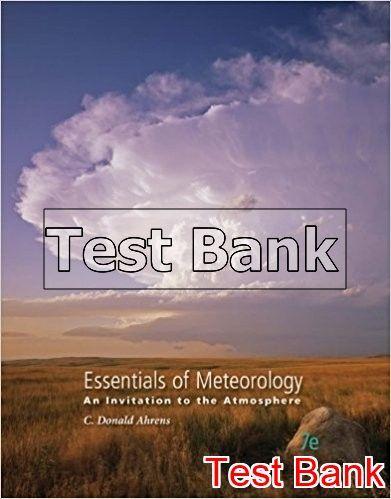
More products digital (pdf, epub, mobi) instant download maybe you interests ...
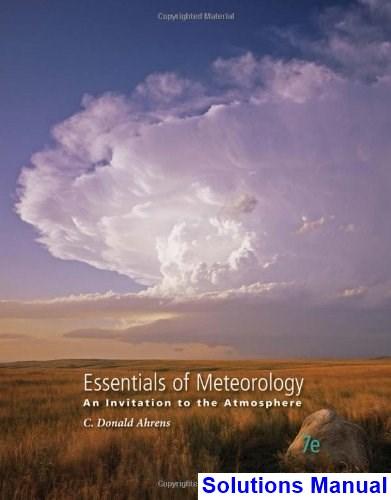
Essentials of Meteorology An Invitation to the Atmosphere 7th Edition Ahrens Solutions Manual
https://testbankfan.com/product/essentials-of-meteorology-aninvitation-to-the-atmosphere-7th-edition-ahrens-solutions-manual/
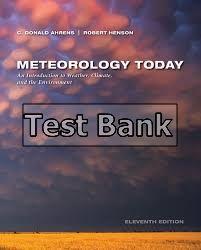
Meteorology Today 11th Edition Ahrens Test Bank
https://testbankfan.com/product/meteorology-today-11th-editionahrens-test-bank/
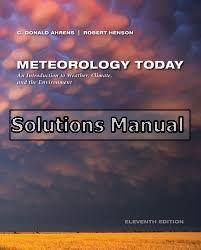
Meteorology Today 11th Edition Ahrens Solutions Manual
https://testbankfan.com/product/meteorology-today-11th-editionahrens-solutions-manual/

Meteorology Today An Introduction to Weather Climate and the Environment 10th Edition Ahrens Test Bank
https://testbankfan.com/product/meteorology-today-anintroduction-to-weather-climate-and-the-environment-10th-editionahrens-test-bank/
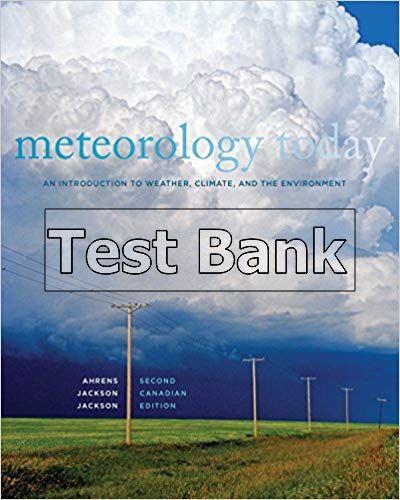
Meteorology Today An Introduction to Weather Climate and the Environment 2nd Edition Ahrens
Test Bank
https://testbankfan.com/product/meteorology-today-anintroduction-to-weather-climate-and-the-environment-2nd-editionahrens-test-bank/
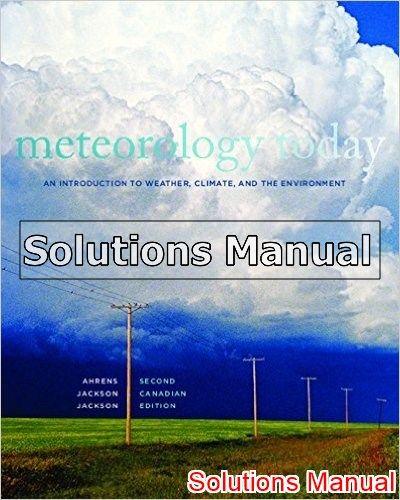
Meteorology Today An Introduction to Weather Climate and the Environment 2nd Edition Ahrens Solutions Manual
https://testbankfan.com/product/meteorology-today-anintroduction-to-weather-climate-and-the-environment-2nd-editionahrens-solutions-manual/

Atmosphere An Introduction to Meteorology 12th Edition Lutgens
Test Bank
https://testbankfan.com/product/atmosphere-an-introduction-tometeorology-12th-edition-lutgens-test-bank/
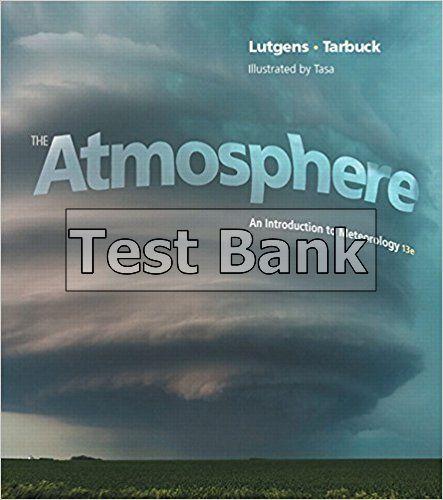
Atmosphere An Introduction to Meteorology 13th Edition Lutgens
Test Bank
https://testbankfan.com/product/atmosphere-an-introduction-tometeorology-13th-edition-lutgens-test-bank/

Invitation to Psychology 7th Edition Wade Test Bank
https://testbankfan.com/product/invitation-to-psychology-7thedition-wade-test-bank/






















































































































































































































































































































































































































Another random document with no related content on Scribd:
in doing all this the critic acts as the appreciator of life; he is not the abstract thinker. He apprehends the ideal intuitively; he reaches it by the help of the feelings and the imagination and a species of exquisite tact, not through a series of syllogisms; he is really a poet, rather than a philosopher. This conception of the nature and functions of criticism makes intelligible and justifies a phrase of Arnold’s that has often been impugned —his description of poetry as a criticism of life. To this account of poetry it has been objected that criticism is an intellectual process, while poetry is primarily an affair of the imagination and the heart; and that to regard poetry as a criticism of life is to take a view of poetry that tends to convert it into mere rhetorical moralizing—the decorative expression in rhythmical language of abstract truth about life. This misinterpretation of Arnold’s meaning becomes impossible, if the foregoing theory of criticism be borne in mind. Criticism is the determination and the representation of the archetypal, of the ideal. Moreover, it is not a determination of the archetypal formally and theoretically, through speculation or the enumeration of abstract qualities; Arnold’s disinclination for abstractions has been repeatedly noted. The process to be used in criticism is a vital process of appreciation, in which the critic, sensitive to the whole value of human life, to the appeal of art and of conduct and of manners as well as of abstract truth, feels his way to a synthetic grasp upon what is ideally best, and portrays this concretely and persuasively for the popular imagination. Such an appreciator of life, if he produce beauty in verse, if he embody his vision of the ideal in metre, will be a poet. In other words, the poet is the appreciator of human life who sees in it most sensitively, inclusively, and penetratingly what is archetypal, and evokes his vision before others through rhythm and rhyme. In this sense poetry can hardly be denied to be a criticism of life; it is the winning portrayal of the ideal of human life as this ideal shapes itself in the mind of the poet. Such a criticism of life Dante gives, a determination and portrayal of what is ideally best in life according to mediæval conceptions; a representation of life in its integrity with a due adjustment of the claims of all the powers that enter into it—friendship, ambition, patriotism, loyalty, religion, artistic ardour, love. Such a criticism of life Shakespeare incidentally gives in terms of the full scope of Elizabethan experience in England, with due imaginative setting forth of the splendid vistas of possible achievement and unlimited development that the new knowledge and the discoveries of the Renaissance had opened. In
short, the great poet is the typically sensitive, penetrative, and suggestive appreciator of life,—who calls to his aid, to make his appreciation as resonant and persuasive as possible, as potent as possible over men’s minds and hearts, all the emotional and imaginative resources of language,— rhythm, figures, allegory, symbolism,—whatever will enable him to impose his appreciation of life upon others and to insinuate into their souls his sense of the relative values of human acts and characters and passions; whatever will help him to make more overweeningly beautiful and insistently eloquent his vision of truth and beauty. In this sense the poet is the limiting ideal of the appreciative critic, and poetry is the ultimate criticism of life—the finest portrayal each age can attain to of what seems to it in life most significant and delightful.
IV
The purpose with which Arnold writes is now fairly apparent. His aim is to shape in happy fashion the lives of his fellows; to free them from the bonds that the struggle for existence imposes upon them; to enlarge their horizons, to enrich them spiritually, and to call all that is best within them into as vivid play as possible. When we turn to Arnold’s literary criticism we shall find this purpose no less paramount.
A glance through the volumes of Arnold’s essays renders it clear that his selection of a poet or a prose-writer for discussion was usually made with a view to putting before English readers some desirable trait of character for their imitation, some temperamental excellence that they are lacking in, some mode of belief that they neglect, some habit of thought that they need to cultivate. Joubert is studied and portrayed because of his single-hearted love of light, the purity of his disinterested devotion to truth, the fine distinction of his thought, and the freedom of his spirit from the sordid stains of worldly life. Heine is a typical leader in the war of emancipation, the arch-enemy of Philistinism, and the light-hearted, indomitable, foe of prejudice and cant. Maurice and Eugénie de Guérin are winning examples of the spiritual distinction that modern Romanism can induce in timelyhappy souls. Scherer, whose critiques upon Milton and Goethe are painstakingly reproduced in the Mixed Essays, represents French critical intelligence in its best play—acute, yet comprehensive; exacting, yet sympathetic; regardful of nuances and delicately refining, and yet virile and
constructive. Of the importance for modern England of emphasis on all these qualities of mind and heart, Arnold was securely convinced.
Moreover, even when his choice of subject is determined by other than moral considerations, his treatment is apt, none the less, to reveal his ethical bias. Again and again in his essays on poetry, for example, it is the substance of poetry that he is chiefly anxious to handle, while the form is left with incidental analysis. Wordsworth is the poet of joy in widest commonalty spread—the poet whose criticism of life is most sound and enduring and salutary. Shelley is a febrile creature, insecure in his sense of worldly values, “a beautiful and ineffectual angel, beating in the void his luminous wings in vain.”[38] The essay on Heine helps us only mediately to an appreciation of the volatile beauty of Heine’s songs, or to an intenser delight in the mere surface play of hues and moods in his verse. From the essay on George Sand, to be sure, we receive many vivid impressions of the emotional and imaginative scope of French romance; for this essay was written con amore in the revivification of an early mood of devotion, and in an unusually heightened style; the essay on Emerson is the one study that has in places somewhat of the same lyrical intensity and the same vividness of realization. Yet even in the essay on George Sand, the essayist is, on the whole, bent on revealing the temperament of the woman rather in its decisive influence on her theories of life than in its reaction upon her art as art. There is hardly a word of the Romance as a definite literary form, of George Sand’s relation to earlier French writers of fiction, or of her distinctive methods of work as a portrayer of the great human spectacle. In short, literature as art, literary forms as definite modes of artistic expression, the technique of the literary craftsman, receive, for the most part, from Arnold, slight attention.
Perhaps the one piece of work in which Arnold set himself, with some thoroughness, to the discussion of a purely literary problem was his series of lectures on Translating Homer. These lectures were produced, before his sense of responsibility for the moral regeneration of the Philistine had become importunate, and were addressed to an academic audience. For these reasons, the treatment of literary topics is more disinterested and less interrupted by practical considerations. Indeed, as will be presently noted in illustration of another aspect of Arnold’s work, these lectures contain very subtle and delicate appreciations, show everywhere exquisite
responsiveness to changing effects of style, and enrich gratefully the vocabulary of impressionistic criticism.
Even in these exceptional lectures, however, Arnold’s ethical interest asserts itself. In the course of them he gives an account of the grand style in poetry,—of that poetic manner that seems to him to stand highest in the scale of excellence; and he carefully notes as an essential of this manner,— of this grand, style,—its moral power; “it can form the character, ... is edifying, ... can refine the raw natural man, ... can transmute him.”[39] This definition of the grand style will be discussed presently in connection with Arnold’s general theory of poetry; it is enough to note here that it illustrates the inseparableness in Arnold’s mind between art and morals.
His description of poetry as a criticism of life has already been mentioned. This doctrine is early implied in Arnold’s writings, for example, in the passage just quoted from the lectures on Translating Homer; it becomes more explicit in the Last Words, appended to these lectures, where the critic asserts that “the noble and profound application of ideas to life is the most essential part of poetic greatness.”[40] It is elaborated in the essays on Wordsworth (1879), on the Study of Poetry (1880), and on Byron (1881). “It is important, therefore,” the essay on Wordsworth assures us, “to hold fast to this: that poetry is at bottom a criticism of life; that the greatness of a poet lies in his powerful and beautiful application of ideas to life,—to the question: How to live.”[41] And in the essay on the Study of Poetry Arnold urges that “in poetry, as a criticism of life under the conditions fixed for such a criticism by the laws of poetic truth and poetic beauty, the spirit of our race will find, ... as time goes on and as other helps fail, its consolation and stay.”[42]
With this doctrine of the indissoluble connection between the highest poetic excellence and essential nobleness of subject-matter probably only the most irreconcilable advocates of art for art’s sake would quarrel. So loyal an adherent of art as Walter Pater suggests a test of poetic “greatness” substantially the same with Arnold’s. “It is on the quality of the matter it informs or controls, its compass, its variety, its alliance to great ends, or the depth of the note of revolt, or the largeness of hope in it, that the greatness of literary art depends, as The Divine Comedy, Paradise Lost, Les Misérables, The English Bible, are great art.”[43] This may be taken as merely a different phrasing of Arnold’s principle that “the greatness of a
poet lies in his powerful and beautiful application of ideas to life—to the question: How to live.” Surely, then, we are not at liberty to press any objection to Arnold’s general theory of poetry on the ground of its being, in its essence, over-ethical.
There remains nevertheless the question of emphasis. In the application to special cases of this test of essential worth, either the critic may be constitutionally biassed in favour of a somewhat restricted range of definite ideas about life, or even when he is fairly hospitable towards various moral idioms, he may still be so intent upon making ethical distinctions as to fail to give their due to the purely artistic qualities of poetry. It is in this latter way that Arnold is most apt to offend. The emphasis in the discussions of Wordsworth, Shelley, Byron, Keats, Gray, and Milton is prevailingly on the ethical characteristics of each poet; and the reader carries away from an essay a vital conception of the play of moral energy and of spiritual passion in the poet’s verse rather than an impression of his peculiar adumbration of beauty, the characteristic rhythms of his imaginative movement, the delicate colour modulations on the surface of his image of life.
It must, however, be borne in mind that Arnold has specially admitted the incompleteness of his description of poetry as “a criticism of life”; this criticism, he has expressly added, must be made in conformity “to the laws of poetic truth and poetic beauty.” “The profound criticism of life” characteristic of “the few supreme masters” must exhibit itself “in indissoluble connection with the laws of poetic truth and beauty.”[44] Is there, then, to be found in Arnold any account of certain laws the observance of which secures poetic beauty and truth? Is there any description of the special ways in which poetic beauty and truth manifest themselves, of the formal characteristics to be found in poetry where poetic beauty and truth are present? Does Arnold either suggest the methods the poet must follow to attain these qualities, or classify the various subordinate effects through which poetic beauty and truth invariably reveal their presence? The most apposite parts of his writings to search for some declaration on these points are the lectures on Translating Homer, and the second series of his essays which deal chiefly with the study of poetry. Here, if anywhere, we ought to find a registration of beliefs as regards the precise nature and source of poetic beauty and truth.
And indeed throughout all these writings, which run through a considerable period of time, Arnold makes fairly consistent use of a halfdozen categories for his analyses of poetic effects. These categories are substance and matter, style and manner, diction and movement. Of the substance of really great poetry we learn repeatedly that it must be made up of ideas of profound significance “on man, on nature, and on human life.”[45] This is, however, merely the prescription already so often noted that poetry, to reach the highest excellence, must contain a penetrating and ennobling criticism of life. In the essay on Byron, however, there is something formally added to this requisition of “truth and seriousness of substance and matter”; besides these, “felicity and perfection of diction and manner, as these are exhibited in the best poets, are what constitute a criticism of life made in conformity with the laws of poetic truth and poetic beauty.”[46] There must then be felicity and perfection of diction and manner in poetry of the highest order; these terms are somewhat vague, but serve at least to guide us on our analytic way. In the essay on the Study of Poetry, there is still farther progress made in the description of poetic excellence. “To the style and manner of the best poetry, their special character, their accent is given by their diction, and, even yet more, by their movement. And though we distinguish between the two characters, the two accents, of superiority” (i.e. between the superiority that comes from substance and the superiority that comes from style), “yet they are nevertheless vitally connected one with the other. The superior character of truth and seriousness, in the matter and substance of the best poetry, is inseparable from the superiority of diction and movement marking its style and manner. The two superiorities are closely related, and are in steadfast proportion one to the other. So far as high poetic truth and seriousness are wanting to a poet’s matter and substance, so far also, we may be sure, will a high poetic stamp of diction and movement be wanting to his style and manner.”[47]
Now that there is this intimate and necessary union between a poet’s mode of conceiving life and his manner of poetic expression, is hardly disputable. The image of life in a poet’s mind is simply the outside world transformed by the complex of sensations and thoughts and emotions peculiar to the poet; and this image inevitably frames for itself a visible and audible expression that delicately utters its individual character—distils that character subtly through word and sentence, rhythm and metaphor, image
and figure of speech, and through their integration into a vital work of art. Moreover, the poet’s style is itself in general the product of the same personality which determines his image of life, and must therefore be, like his image of life, delicately striated with the markings of his play of thought and feeling and fancy. The close correspondence, then, between the poet’s subject-matter and his manner or style is indubitable. The part of Arnold’s conclusion or the point in his method that is regrettable is the exclusive stress that he throws on this dependence of style upon worth of substance. He converts style into a mere function of the moral quality of a poet’s thought about life, and fails to furnish any delicately studied categories for the appreciation of poetic style apart from its moral implications.
Take, for example, the judgments passed in the Study of Poetry upon various poets; in every instance the estimate of the poet’s style turns upon the quality of his thought about life. Is it Chaucer whose right to be ranked as a classic is mooted? He cannot be ranked as a classic because “the substance of” his poetry has not “high seriousness.”[48] Is it Burns whose relative rank is being fixed? Burns through lack of “absolute sincerity” falls short of “high seriousness,” and, hence, is not to be placed among the classics. And thus continually with Arnold, effects of style are merged in moral qualities, and the reader gains little insight into the refinements of poetical manner except as these derive directly from the poet’s moral consciousness. The categories of style and manner, diction and movement, are everywhere subordinated to the categories of substance and matter, are treated as almost wholly derivative. “Felicity and perfection of diction and manner,” wherever they are admittedly present, are usually explained as the direct result of the poet’s lofty conception of life. Such a treatment of questions of style does not further us much on our way to a knowledge of the “laws of poetic beauty and poetic truth.”
Doubtless somewhat more disinterested analyses of style may be found in the lectures on Translating Homer. These discussions do not reach very definite conclusions, but they at least consider poetic excellence as for the moment dependent on something else than the moral mood of the poet. For example, the grand style is analyzed into two varieties, the grand style in severity and the grand style in simplicity. Each of these styles is described and illustrated so that it enters into the reader’s imagination and increases his sensitiveness to poetic excellence. Somewhat later in the lectures, the distinction between real simplicity in poetic style and sophisticated
simplicity is drawn with exquisite delicacy of appreciation. Throughout these passages, there is an effort to deal directly with artistic effects for their own sake and apart from their significance as expressive of ethos. Yet even here Arnold’s ethical bias reveals itself in a tendency, while he is describing the moods back of these artistic qualities, to use words that have moral implications, and that suggest the issue of such moods in conduct. Selfrestraint, proud gravity, are among the moods that are found back of the grand style in severity; over-refinement, super-subtle sophistication, account for Tennyson’s simplesse.
To bring together, then, the results of this somewhat protracted analysis: Arnold ostensibly admits that poetry, to be of the highest excellence, must, in addition to containing a criticism of life of profound significance, conform to the laws of poetic beauty and truth. He accepts as necessary categories, for the appreciation of poetical excellence, style and manner, diction and movement. Yet his most important general assertion about these latter purely formal determinations of poetry is that they are inseparably connected with substance and matter; similarly, whenever he discusses artistic effects, he is apt to find them interesting simply as serving to interpret the artist’s prevailing mood towards life; and even where, as is at times doubtless the case, he escapes for the moment from his ethical interest and appreciates with imaginative delicacy the individual quality of a poem or a poet’s style, he is nearly always found sooner or later explaining this quality as originating in the poet’s peculiar ethos. As for any systematic or even incidental study of “the laws of poetic beauty and truth,” we search for it through his pages in vain.
VBut it would be wrong in characterizing Arnold’s essays to attribute their lack of theorizing about questions of art solely to his preoccupation with conduct. For theory in general and for abstractions in general,—for all sorts of philosophizing,—Arnold openly professes his dislike. “Perhaps we shall one day learn,” he says, in his essay on Wordsworth, “to make this proposition general, and to say: Poetry is the reality, philosophy the illusion.” Distrust of the abstract and of the purely theoretical shows itself throughout his literary criticism and determines many of its characteristics.
His hostility to systems and to system-makers has already been pointed out; this hostility admits of no exception in favour of the systematic critic. “There is the judgment of ignorance, the judgment of incompatibility, the judgment of envy and jealousy. Finally, there is the systematic judgment, and this judgment is the most worthless of all.... Its author has not really his eye upon the professed object of his criticism at all, but upon something else which he wants to prove by means of that object. He neither really tells us, therefore, anything about the object, nor anything about his own ignorance of the object. He never fairly looks at it; he is looking at something else.”[49] This hypnotizing effect that a preconceived theory exerts on a critic, is Arnold’s first reason for objecting to systematic criticism; the critic with a theory is bound to find what he goes in search of, and nothing else. He goes out—to change somewhat one of Arnold’s own figures—like Saul, the son of Kish, in search of his father’s asses; and he comes back with the authentic animals instead of the traditional windfall of a kingdom.
Nor is preoccupation with a pet theory the sole incapacity that Arnold finds in the systematic critic; such a critic is almost sure to be overintellectualized, a victim of abstractions and definitions, dependent for his judgments on conceptions, and lacking in temperamental sensitiveness to the appeal of literature as art. He is merely a triangulator of the landscape of literature, and moves resolutely in his process of triangulation from one fixed point to another; he finds significant only such parts of his literary experience as he can sum up in a definite abstract formula at some one of these arbitrary halting-places; his ultimate opinion of the ground he covers is merely the sum total of a comparatively small number of such abstract expressions. To the manifold wealth of the landscape in colour, in light, in shade, and in poetic suggestiveness, the system-monger, the theoretical critic, has all the time been blind.
Knowledge, too, even though it be not severely systematized, may interfere with the free play of critical intelligence. An oversupply of unvitalized facts or ideas, even though these facts or ideas be not organized into an importunate theory, may prove disastrous to the critic. This danger Arnold has amusingly set forth in his Last Words on Homeric translation: “Much as Mr. Newman was mistaken when he talked of my rancour, he is entirely right when he talks of my ignorance. And yet, perverse as it seems to say so, I sometimes find myself wishing, when dealing with these matters
of poetical criticism, that my ignorance were even greater than it is. To handle these matters properly, there is needed a poise so perfect that the least overweight in any direction tends to destroy the balance. Temper destroys it, a crotchet destroys it, even erudition may destroy it. To press to the sense of the thing with which one is dealing, not to go off on some collateral issue about the thing, is the hardest matter in the world. The ‘thing itself’ with which one is here dealing—the critical perception of poetic truth—is of all things the most volatile, elusive, and evanescent; by even pressing too impetuously after it, one runs the risk of losing it. The critic of poetry should have the finest tact, the nicest moderation, the most free, flexible, and elastic spirit imaginable; he should be, indeed, the ‘ondoyant et divers,’ the undulating and diverse being of Montaigne. The less he can deal with his object simply and freely, the more things he has to take into account in dealing with it,—the more, in short, he has to encumber himself,—so much the greater force of spirit he needs to retain his elasticity. But one cannot exactly have this greater force by wishing for it; so, for the force of spirit one has, the load put upon it is often heavier than it will well bear. The late Duke of Wellington said of a certain peer that ‘it was a great pity his education had been so far too much for his abilities.’ In like manner one often sees erudition out of all proportion to its owner’s critical faculty. Little as I know, therefore, I am always apprehensive, in dealing with poetry, lest even that little should prove too much for my abilities.”[50]
Discreet ignorance, then, is Arnold’s counsel of perfection to the wouldbe critic. And, accordingly, he himself is desultory from conscientious motives and unsystematic by fixed rule. There are two passages in his writings where he explains confidentially his methods and his reasons for choosing them. The first occurs in a letter of 1864: “My sinuous, easy, unpolemical mode of proceeding has been adopted by me, first, because I really think it the best way of proceeding, if one wants to get at, and keep with, truth; secondly, because I am convinced only by a literary form of this kind being given to them can ideas such as mine ever gain any access in a country such as ours.”[51] The second passage occurs in the Preface to his first series of Essays in Criticism (1865): “Indeed, it is not in my nature— some of my critics would rather say not in my power—to dispute on behalf of any opinion, even my own, very obstinately. To try and approach truth on one side after another, not to strive or cry, not to persist in pressing forward,
on any one side, with violence and self-will, it is only thus, it seems to me, that mortals may hope to gain any vision of the mysterious goddess, whom we shall never see except in outline. He who will do nothing but fight impetuously towards her, on his own one favourite particular line, is inevitably destined to run his head into the folds of the black robe in which she is wrapped.”[52]
Such, then, is Arnold’s ideal of critical method. The critic is not to move from logical point to point as, for example, Francis Jeffrey was wont, in his essays, to move, with an advocate’s devotion to system and desire to make good some definite conclusion. Rather he is to give rein to his temperament; he is to make use of intuitions, imaginations, hints that touch the heart, as well as abstract principles, syllogisms, and arguments; and so he is to reach out tentatively through all his powers after truth if haply he may find her; in the hope that thus, keeping close to the concrete aspects of his subject, he may win to an ever more inclusive and intimate command of its surface and configurations. The type of mind most apt for this kind of critical work is the “free, flexible, and elastic spirit,” described in the passage just quoted from the Last Words; the “undulating and diverse being of Montaigne.”
A critic of this type will palpably concern himself slightly with abstractions, with theorizings, with definitions. And, indeed, Arnold’s unwillingness to define becomes at times almost ludicrous. “Nothing has raised more questioning among my critics than these words—noble, the grand style.... Alas! the grand style is the last matter in the world for verbal definition to deal with adequately. One may say of it as is said of faith: ‘One must feel it in order to know it.’ ”[53] Similarly in the Study of Poetry, Arnold urges: “Critics give themselves great labour to draw out what in the abstract constitutes the characters of a high quality of poetry. It is much better to have recourse to concrete examples.... If we are asked to define this mark and accent in the abstract, our answer must be: No, for we should thereby be darkening the question, not clearing it.” Again: “I may discuss what in the abstract constitutes the grand style; but that sort of general discussion never much helps our judgment of particular instances.”[54] These passages are characteristic; rarely indeed does Arnold consent to commit himself to the control of a definition. He prefers to convey into his readers’ mind a living realization of the thing or the object he treats of rather than to put before them its logically articulated outlines.
Moreover, when he undertakes the abstract discussion of a general term, he is apt to be capricious in his treatment of it and to follow in his subdivisions and classifications some external clue rather than logical structure. In the essay on Celtic Literature he discusses the various ways of handling nature in poetry, and finds four such ways—the conventional way, the faithful way, the Greek way, and the magical way. The classification recommends itself through its superficial charm and facility, yet rests on no psychological truth, or at any rate carries with it, as Arnold treats it, no psychological suggestions; it gives no swift insight into the origin in the poet’s mind and heart of these different modes of conceiving of nature. Hence the classification, as Arnold uses it, is merely a temporary makeshift for rather gracefully grouping effects, not an analytic interpretation of these effects through a reduction of them to their varying sources in thought and feeling.
This may be taken as typical of Arnold’s critical methods. As we read his essays we have little sense of making definite progress in the comprehension of literature as an art among arts, as well as in the appreciation of an individual author or poem. We are not being intellectually oriented, as in reading the most stimulating critical work; we are not getting an ever-surer sense of the points of the compass. Essays, to have this orienting power, need not be continually prating of theories and laws; they need not be rabidly scientific in phrase or in method. But they must issue from a mind that has come to an understanding with itself about the genesis of art in the genius of the artist; about the laws that, when the utmost plea has been made for freedom and caprice, regulate artistic production; about the history and evolution of art forms; and about the relations of the arts among themselves and to the other activities of life. It may fairly be doubted if Arnold had ever wrought out for himself consistent conclusions on all or most of these topics. Indeed, the mere mention of his name in connection with such a formal list of topics suggests the kind of mock-serious deprecatory paragraph with which the “unlearned bellettristic trifler” was wont to reply to charges of dilettantism—a paragraph sure to carry in its tail a stinging bit of sarcasm at the expense of pedantry and unenlightened formalism. And yet, great as must be every one’s respect for the thorough scholarship and widely varied accomplishment that Arnold made so light of and carried off so easily, the doubt must nevertheless remain whether a firmer grasp on theory, and a more consistent habit of
thinking out literary questions to their principles, would not have invigorated his work as a critic and given it greater permanence and richer suggestiveness.
VI
It is, then, as an appreciator of what may perhaps be called the spiritual qualities of literature that Arnold is most distinctively a furtherer of criticism. An appreciator of beauty,—of true beauty wherever found,—that is what he would willingly be; and yet, as the matter turns out, the beauty that he most surely enjoys and reveals has invariably a spiritual aroma,—is the finer breath of intense spiritual life. Or, if spiritual be too mystical a word to apply to Homer and Goethe, perhaps Arnold should rather be termed an appreciator of such beauty in literature as carries with it an inevitable suggestion of elevation and nobleness of character in the author.
The importance of appreciation in criticism Arnold has described in one of the Mixed Essays: “Admiration is salutary and formative; ... but things admirable are sown wide, and are to be gathered here and gathered there, not all in one place; and until we have gathered them wherever they are to be found, we have not known the true salutariness and formativeness of admiration. The quest is large; and occupation with the unsound or halfsound, delight in the not good or less good, is a sore let and hindrance to us. Release from such occupation and delight sets us free for ranging farther, and for perfecting our sense of beauty. He is the happy man, who, encumbering himself with the love of nothing which is not beautiful, is able to embrace the greatest number of things beautiful in his life.”[55]
On this disinterested quest, then, for the beautiful, Arnold in his essays nominally fares forth. Yet certain limitations in his appreciation, over and beyond his prevalent ethical interest, must at once be noted. Music, painting, and sculpture have seemingly nothing to say to him. In his Letters there are only a few allusions to any of these arts, and such as occur do not surpass in significance the comments of the chance loiterer in foreign galleries or visitor of concert rooms. In his essays there are none of the correlations between the effects and methods of literature and those of kindred arts that may do so much either to individualize or to illustrate the characteristics of poetry. For Arnold, literature and poetry seem to make up the whole range of art.
Within these limits, however,—the limits imposed by preoccupation with conduct and by carelessness of all arts except literature,—Arnold has been a prevailing revealer of beauty. Not his most hostile critic can question the delicacy of his perception, so far as he allows his perception free play. On the need of nice and ever nicer discriminations in the apprehension of the shifting values of literature, he has himself often insisted. Critics who let their likes and dislikes assert themselves turbulently, to the destruction of fine distinctions, always fall under Arnold’s condemnation. “When Mr. Palgrave dislikes a thing, he feels no pressure constraining him, either to try his dislike closely or to express it moderately; he does not mince matters, he gives his dislike all its own way.... He dislikes the architecture of the Rue Rivoli, and he puts it on the level with the architecture of Belgravia and Gower Street; he lumps them all together in one condemnation; he loses sight of the shade, the distinction which is here everything.” For a similar blurring of impressions, Professor Newman is taken to task, though in Newman’s case the faulty appreciations are due to a different cause: “Like all learned men, accustomed to desire definite rules, he draws his conclusions too absolutely; he wants to include too much under his rules; he does not quite perceive that in poetical criticism the shade, the fine distinction, is everything; and that, when he has once missed this, in all he says he is in truth but beating the air.” Here, again, what Arnold pleads for is temperamental sensitiveness, delicacy of perception. To appreciate literature more and more sensitively in terms of “an undulating and diverse temperament,” this is the ideal that he puts before literary criticism.
His own appreciations of poetry are probably richest, most discriminating, and most disinterested in the lectures on Translating Homer. The imaginative tact is unfailing with which he renders the contour and the subject-qualities of the various poems that he comments on; and equally noteworthy is the divining instinct with which he captures the spirit of each poet and sets it before us with a phrase or a symbol. The “inversion and pregnant conciseness” of Milton’s style, its “laborious and condensed fulness”; the plainspokenness, freshness, vigorousness, and yet fancifulness and curious complexity of Chapman’s style; Spenser’s “sweet and easy slipping movement”; Scott’s “bastard epic style”; the “one continual falsetto” of Macaulay’s “pinchbeck Roman Ballads,”—all these characterizations are delicately sure in their phrasing and suggestion, and are the clearer because the various styles are made to stand in continual
contrast with Homer’s style, the rapidity, directness, simplicity, and nobleness of which Arnold keeps ever present in our consciousness. Incidentally, too, such suggestive discriminations as that between simplesse and simplicité, the “semblance” of simplicity and the “real quality,” are wrought out for the reader as the critic goes on with his pursuit of the essential qualities of Homeric thought and diction. To read these lectures is a thoroughly tempering process; a process that renders the mind and imagination permanently finer in texture, more elastic, more sensitively sure in tone, and subtly responsive to the demands of good art.
The essay on the Study of Poetry, which was written as preface to Ward’s English Poets, is also rich in appreciation, and at times almost as disinterested as the lectures on Homer; yet perhaps never quite so disinterested. For in the Study of Poetry Arnold is persistently aware of his conception of “the grand style” and bent on winning his readers to make it their own. Only poets who attain this grand style deserve to be “classics,” and the continual insistence on the note of “high seriousness”—its presence or absence—becomes rather wearisome. Moreover, Arnold’s preoccupation with this ultimate manner and quality tends to limit the freedom and delicate truth of his appreciations of other manners and minor qualities. At times, one is tempted to charge Arnold with some of the unresponsiveness of temperament that he ascribes to systematic critics, and to find even Arnold himself under the perilous sway of a fixed idea. Yet, when all is said, the Study of Poetry is full of fine things, and does much to widen the range of appreciation, and, at the same time, to make appreciation more certain. “The liquid diction, the fluid movement of Chaucer, his large, free, sound representation of things”; Burns’s “touches of piercing, sometimes almost intolerable, pathos,” his “archness,” too, and his “soundness”; Shelley, “that beautiful spirit building his many-coloured haze of words and images ‘Pinnacled dim in the intense inane’ ”; these, and other interpretations like them, are easily adequate and carry the qualities of each poet readily into the minds and imaginations of sympathetic readers. Appreciation is much the richer for this essay on the Study of Poetry.
Nor must Arnold’s suggestive appreciations of prose style be forgotten. Several of them have passed into standard accounts of clearly recognized varieties of prose diction. Arnold’s phrasing of the matter has made all sensitive English readers permanently more sensitive to “the warm glow, blithe movement, and soft pliancy of life” of the Attic style, and also
permanently more hostile to “the over-heavy richness and encumbered gait” of the Asiatic style. Equally good is his account of the Corinthian style: “It has glitter without warmth, rapidity without ease, effectiveness without charm. Its characteristic is that it has no soul; all it exists for, is to get its ends, to make its points, to damage its adversaries, to be admired, to triumph. A style so bent on effect at the expense of soul, simplicity, and delicacy; a style so little studious of the charm of the great models; so far from classic truth and grace, must surely be said to have the note of provinciality.”[56] “Middle-class Macaulayese” is his name for Hepworth Dixon’s style; a style which he evidently regards as likely to gain favour and establish itself. “I call it Macaulayese ... because it has the same internal and external characteristics as Macaulay’s style; the external characteristic being a hard, metallic movement with nothing of the soft play of life, and the internal characteristic being a perpetual semblance of hitting the right nail on the head without the reality. And I call it middle-class Macaulayese, because it has these faults without the compensation of great studies and of conversance with great affairs, by which Macaulay partly redeemed them.”[57] It will, of course, be noted that these latter appreciations deal for the most part with divergences from the beautiful in style, but they none the less quicken and refine the æsthetic sense.
Finally, throughout the two series of miscellaneous essays there is, in the midst of much business with ethical matters, an often-recurring free play of imagination in the interests, solely and simply, of beauty. Many are the happy windfalls these essays offer of delicate interpretation both of poetic effect and of creative movement, and many are the memorable phrases and symbols by which incidentally the essential quality of a poet or prose-writer is securely lodged in the reader’s consciousness.
And yet, wide ranging and delicately sensitive as are Arnold’s appreciations, the feeling will assert itself, in a final survey of his work in literary criticism, that he nearly always has designs on his readers and that appreciation is a means to an end. The end in view is the exorcism of the spirit of Philistinism. Arnold’s conscience is haunted by this hideous apparition as Luther’s was by the devil, and he is all the time metaphorically throwing his inkstand at the spectre. Or, to put the matter in another way, his one dominating wish is to help modern Englishmen to “conquer the hard unintelligence” which is “their bane; to supple and
reduce it by culture, by a growth in the variety, fulness, and sweetness of their spiritual life”; and the appreciative interpretation of literature to as wide a circle of readers as possible seems to him one of the surest ways of thus educing in his fellow-countrymen new spiritual qualities. It must not be forgotten that Matthew Arnold was the son of Thomas Arnold, master of Rugby; there is in him a hereditary pedagogic bias—an inevitable trend towards moral suasion. The pedagogic spirit has suffered a sea-change into something rich and strange, and yet traces of its origin linger about it. Criticism with Arnold is rarely, if ever, irresponsible; it is our schoolmaster to bring us to culture.
In a letter of 1863 Arnold speaks of the great transformation which “in this concluding half of the century the English spirit is destined to undergo.” “I shall do,” he adds, “what I can for this movement in literature; freer perhaps in that sphere than I could be in any other, but with the risk always before me, if I cannot charm the wild beast of Philistinism while I am trying to convert him, of being torn in pieces by him.”[58] In charming the wild beast Arnold ultimately succeeded; and yet there is a sense in which he fell a victim to his very success. The presence of the beast, and the necessity of fluting to him debonairly and winningly, fastened themselves on Arnold’s imagination, and subdued him to a comparatively narrow range of subjects and set of interests. From the point of view, at least, of what is desirable in appreciative criticism, Arnold was injured by his sense of responsibility; he lacks the detachment and the delicate mobility that are the redeeming traits of modern dilettantism.
If, then, we regard Arnold as a writer with a task to accomplish, with certain definite regenerative purposes to carry out, with a body of original ideas about the conduct of life to inculcate, we must conclude that he succeeded admirably in his work, followed out his ideas with persistence and temerity through many regions of human activity, and embodied them with unwearying ingenuity and persuasiveness in a wide range of discussions. If, on the other hand, we consider him solely as a literary critic, we are forced to admit that he is not the ideal literary critic; he is not the ideal literary critic because he is so much more, and because his interests lie so decisively outside of art. Nor is this opinion meant to imply an ultimate theory of art for art’s sake, or to suggest any limitation of criticism to mere impressionism or appreciation. Literature must be known historically and philosophically before it can be adequately appreciated; that is emphatically
true. Art may or may not be justifiable solely as it is of service to society; that need not be debated. But, in any event, literary criticism, if it is to reach its utmost effectiveness, must regard works of art for the time being as selfjustified integrations of beauty and truth, and so regarding them must record and interpret their power and their charm. And this temporary isolating process is just the process which Arnold very rarely, for the reasons that have been traced in detail, is willing or able to go through with.
VII
When we turn to consider Arnold’s literary style, we are forced to admit that this, too, has suffered from the strenuousness of his moral purpose; it has been unduly sophisticated, here and there, because of his desire to charm “the wild beast of Philistinism.” To this purpose and this desire is owing, at least in part, that falsetto note—that half-querulous, halfsupercilious artificiality of tone—which is now and then to be heard in his writing. To exaggerate the extent to which this note is audible would doubtless be easy; an unprejudiced reader will find long continuous passages of even Arnold’s most elaborately designed writing free from any trace of undue self-consciousness or of gentle condescension. And yet it is undeniable that when, apart from his Letters, Arnold’s prose, as a whole, is compared with that of such a writer, for example, as Cardinal Newman, there is in Arnold’s style, as the ear listens for the quality of the bell-metal, not quite the same beautifully clear and sincere resonance. There seems to be, now and then, some unhappy warring of elements, some ill-adjustment of over-tones, a trace of some flaw in mixing or casting.
Are not these defects in Arnold’s style due to his somewhat selfconscious attempt to fascinate a recalcitrant public? Is it not the assumption of a manner that jars on us often in Arnold’s less happy moments? Has he not the pose of the man who overdoes bravado with the hope of getting cleverly through a pass which he feels a bit trying to his nerves? Arnold has a keen consciousness of the very stupid beast of Philistinism lying in wait for him; and in the stress of the moment he is guilty of a little exaggeration of manner; he is just a shade unnatural in his flippancy; he treads his measure with an unduly mincing flourish.
Arnold’s habit of half-mocking self-depreciation and of insincere apology for supposititious personal shortcomings has already been
mentioned; to his controversial writings, particularly, it gives often a raspingly supercilious tone. He insists with mock humbleness that he is a “mere bellettristic trifler”; that he has no “system of philosophy with principles coherent, interdependent, subordinate, and derivative” to help him in the discussion of abstract questions. He assures us that he is merely “a feeble unit” of the “English middle class”; he deprecates being called a professor because it is a title he shares “with so many distinguished men— Professor Pepper, Professor Anderson, Professor Frickel, and others—who adorn it,” he feels, much more than he does. These mock apologies are always amusing and yet a bit exasperating too. Why should Arnold regard it, we ask ourselves, as such a relishing joke—the possibility that he has a defect? The implication of almost arrogant self-satisfaction is troublesomely present to us. Such passages certainly suggest that Arnold had an ingrained contempt for the “beast” he was charming.
Yet, when all is said, much of this supercilious satire is irresistibly droll, and refuses to be gainsaid. One of his most effective modes of ridiculing his opponents is through conjuring up imaginary scenes in which some ludicrous aspect of his opponent’s case or character is thrown into diverting prominence. Is it the pompous, arrogant self-satisfaction of the prosperous middle-class tradesman that Arnold wishes to satirize? And more particularly is it the futility of the Saturday Review in holding up Benthamism—the systematic recognition of such a smug man’s ideal of selfish happiness—as the true moral ideal? Arnold represents himself as travelling on a suburban railway on which a murder has recently been committed, and as falling into chat with the middle-class frequenters of this route. The demoralization of these worthy folk, Arnold assures us, was “something bewildering.” “Myself a transcendentalist (as the Saturday Review knows), I escaped the infection; and, day after day, I used to ply my agitated fellow-travellers with all the consolations which my transcendentalism would naturally suggest to me. I reminded them how Cæsar refused to take precautions against assassination, because life was not worth having at the price of an ignoble solicitude for it. I reminded them what insignificant atoms we all are in the life of the world. ‘Suppose the worst to happen,’ I said, addressing a portly jeweller from Cheapside; ‘suppose even yourself to be the victim; il n’y a pas d’homme nécessaire. We should miss you for a day or two upon the Woodford Branch; but the great mundane movement would still go on, the gravel walks of your villa
would still be rolled, dividends would still be paid at the Bank, omnibuses would still run, there would still be the old crush at the corner of Fenchurch Street.’ All was of no avail. Nothing could moderate in the bosom of the great English middle class, their passionate, absorbing, almost bloodthirsty clinging to life.” This is, of course, “admirable fooling”; and equally, of course, the little imaginary scene serves perfectly the purposes of Arnold’s argument and turns into ridicule the narrowness and overweening selfimportance of the smug tradesman.
Another instance of Arnold’s ability to conjure up fancifully a scene of satirical import may be adduced from the first chapter of Culture and Anarchy. Arnold has been ridiculing the worship of mere “bodily health and vigour” as ends in themselves. “Why, one has heard people,” he exclaims, “fresh from reading certain articles of the Times on the Registrar General’s returns of marriages and births in this country, who would talk of our large English families in quite a solemn strain, as if they had something in itself, beautiful, elevating, and meritorious in them; as if the British Philistine would have only to present himself before the Great Judge with his twelve children, in order to be received among the sheep as a matter of right!”
It is a fact worth remarking that in his prose Arnold’s imagination seems naturally to call up and visualize only such scenes as those that have just been quoted—scenes that are satirically and even maliciously suggestive; scenes, on the other hand, that have the limpid light and the winning quality of many in Cardinal Newman’s writings—scenes that rest the eye and commend themselves simply and graciously to the heart—are in Arnold’s prose rarely, if ever, to be found. This seems the less easy to explain inasmuch as his poetry, though of course not exceptionally rich in colour, nevertheless shows everywhere a delicately sure sense of the surface of life. Nor is it only the large sweep of the earth-areas or the diversified play of the human spectacle that is absent from Arnold’s prose; his imagination does not even make itself exceptionally felt through concrete phrasing or warmth of colouring; his style is usually intellectual almost to the point of wanness, and has rarely any of the heightened quality of so-called poetic prose. In point of fact, this conventional restraint in Arnold’s style, this careful adherence to the mood of prose, is a very significant matter; it distinguishes Arnold both as writer and as critic of life from such men as Carlyle and Mr. Ruskin. The meaning of this quietly conventional manner will be later considered in the discussion of Arnold’s relation to his age.
The two pieces of writing where Arnold’s style has most fervour and imaginative glow are the essay on George Sand and the discourse on Emerson. In each case he was returning in the choice of his subject to an earlier enthusiasm, and was reviving a mood that had for him a certain romantic consecration. George Sand had opened for him, while he was still at the University, a whole world of rich and half-fearful imaginative experience; a world where he had delighted to follow through glowing southern landscapes the journeyings of picturesquely rebellious heroes and heroines, whose passionate declamation laid an irresistible spell on his English fancy. Her love and portrayal of rustic nature had also come to him as something graciously different from the sterner and more moral or spiritual interpretation of rustic life to be found in Wordsworth’s poems. Her personality, in all its passionate sincerity and with its pathetically unrewarded aspirations, had imposed itself on Arnold’s imagination both as this personality was revealed in her books and as it was afterward encountered in actual life. All these early feelings Arnold revives in a memorial essay written in 1877, one year after George Sand’s death. From first to last the essay has a brooding sincerity of tone, an unconsidering frankness, and an intensity and colour of phrase that are noteworthy. The descriptions of nature, both of the landscapes to be found in George Sand’s romances and of those in the midst of which she herself lived, have a luxuriance and sensuousness of surface that Arnold rarely condescends to. The tone of unguarded devotion may be represented by part of the concluding paragraph of the essay: “It is silent, that eloquent voice! it is sunk, that noble, that speaking head! We sum up, as we best can, what she said to us, and we bid her adieu. From many hearts in many lands a troop of tender and grateful regrets converge towards her humble churchyard in Berry. Let them be joined by these words of sad homage from one of a nation which she esteemed, and which knew her very little and very ill.” There can be no question of the passionate sincerity and the poetic beauty of this passage.
Comparable in atmosphere and tone to this essay on George Sand is the discourse on Emerson, in certain parts of which Arnold again has the courage of his emotions. In the earlier paragraphs there is the same revivification of a youthful mood as in the essay on George Sand. There is also the same only half-restrained pulsation in the rhythm, an emotional throb that at times almost produces an effect of metre. “Forty years ago,
when I was an undergraduate at Oxford, voices were in the air there which haunt my memory still. Happy the man who in that susceptible season of youth hears such voices! they are a possession to him forever.” Of this discourse, however, only the introduction and the conclusion are of this intense, self-communing passionateness; the analysis of Emerson’s qualities as writer and thinker, that makes up the greater part of the discourse, has Arnold’s usual colloquial, self-consciously wary tone.
A fairly complete survey of the characteristics of Arnold’s style may perhaps best be obtained by recognizing in his prose-writings four distinct manners. First may be mentioned his least compromising, severest, most exact style; it is most consistently present in the first of the Mixed Essays, that on Democracy (1861). The sentences are apt to be long and periodic. The structure of the thought is defined by means of painstakingly accurate articulations. Progress in the discussion is systematic and is from time to time conscientiously noted. The tone is earnest, almost anxious. A strenuous, systematic, responsible style, we may call it. Somewhat mitigated in its severities, somewhat less palpably official, it remains the style of Arnold’s technical reports upon education and of great portions of his writings on religious topics. It is, however, most adequately exhibited in the essay on Democracy.
Simpler in tone, easier, more colloquial, more casual, is the style that Arnold uses in his literary essays, in the uncontroversial parts of the lectures on Translating Homer, and in Culture and Anarchy. This style is characterized by its admirable union of ease, simplicity, and strength; by the affability of its tone, an affability, however, that never degenerates into over-familiarity or loses dignified restraint; by its disregard of method, or of the more pretentious manifestations of method; and by the delicate certainty with which, when at its best, it takes the reader, despite its apparently casual movement, over the essential aspects of the subject under discussion. This is really Arnold’s most distinctive manner, and it will require, after his two remaining manners have been briefly noted, some further analysis.
Arnold’s third style is most apt to appear in controversial writings or in his treatment of subjects where he is particularly aware of his enemy, or particularly bent on getting a hearing from the inattentive through cleverly malicious satire, or particularly desirous of carrying things off with a nonchalant air. It appears in the controversial parts of the lectures on Translating Homer, in many chapters of Culture and Anarchy, and runs
throughout Friendship’s Garland. Its peculiarly rasping effect upon many readers has already been described. It is responsible for much of the prejudice against Arnold’s prose.
Arnold’s fourth style—intimate, rich in colour, intense in feeling, almost lyrical in tone—is the style that has just been noted as appearing in the essays on George Sand and on Emerson. There are not many passages in Arnold’s prose where this style has its way with him. But these passages are so individual, and seem to reveal Arnold with such novelty and truth, that the style that pervades them deserves to be put by itself.
The style usually taken as characteristically Arnold’s is that here classed as his second, with a generous admixture of the third. Many of the qualities of this style have already been suggested as illustrative of certain aspects of Arnold’s temperament or habits of thought. Various important points, however, still remain to be appreciated.
Colloquial in its rhythms and its idiom this style surely is. It is fond of assenting to its own propositions; “well” and “yes” often begin its sentences —signs of its casual and tentative mode of advance. Arnold’s frequent use of “well” and “yes” and neglect of the anxiously demonstrative “now,” at the opening of his sentences, mark unmistakably the unrigorousness of his method. An easily negligent treatment of the sentence, too, is often noticeable; a subject is left suspended while phrase follows phrase, or even while clause follows clause, until, quite as in ordinary talk, the subject must be repeated, the beginning of the sentence must be brought freshly to mind. Often Arnold ends a sentence and begins the next with the same word or phrase; this trick is better suited to talk than to formal discourse. Indeed, Arnold permits himself not a few of the inaccuracies of every-day speech. He uses the cleft infinitive; he introduces relative clauses with superfluous “and” or “but”; he confuses the present participle with the verbal noun and speaks, for example, of “the creating a current”; and he usually “tries and does” a thing instead of “trying to do” it. Finally, his prose abounds in exclamations and in italicized words or phrases, and so takes on much of the movement and rhythm of talk, as in the following passage: “But the gloomy, oppressive dream is now over. ‘Let us return to Nature!’ And all the world salutes with pride and joy the Renascence, and prays to Heaven: ‘Oh, that Ishmael might live before thee!’ Surely the future belongs to this brilliant newcomer, with his animating maxim: Let us return to Nature! Ah, what pitfalls are in that word Nature! Let us return to art and science, which
are a part of Nature; yes. Let us return to a proper conception of righteousness, to a true sense of the method and secret of Jesus, which have been all denaturalized; yes. But, ‘Let us return to Nature!’—do you mean that we are to give full swing to our inclinations?”[59] The colloquial character of these exclamations and the search, through the use of italics, for stress like the accent of speech are unmistakable.
Arnold’s fundamental reason, conscious or unconscious, for the adoption of this colloquial tone and manner, may probably be found in the account of the ultimate purpose of all his writing, given near the close of Culture and Anarchy; he aims, not to inculcate an absolutely determinate system of truth, but to stir his readers into the keenest possible self-questioning over the worth of their stock ideas. “Socrates has drunk his hemlock and is dead; but in his own breast does not every man carry about with him a possible Socrates, in that power of disinterested play of consciousness upon his stock notions and habits, of which this wise and admirable man gave all through his lifetime the great example, and which was the secret of his incomparable influence? And he who leads men to call forth and exercise in themselves this power, and who busily calls it forth and exercises it in himself, is at the present moment, perhaps, as Socrates was in his time, more in concert with the vital working of men’s minds, and more effectually significant, than any House of Commons’ orator, or practical operator in politics.”[60] This dialectical habit of mind is, Arnold believes, best induced and stimulated by the free colloquial manner of writing that he usually adopts.
In the choice of words, however, Arnold is not noticeably colloquial. Less often in Arnold than in Newman is a familiar phrase caught audaciously from common speech and set with a sure sense of fitness and a vivifying effect in the midst of more formal expressions. His style, though idiomatic, stops short of the vocabulary of every day; it is nice— instinctively edited. Certain words are favourites with him, and, as is so often the case with the literary temperament, reveal special preoccupations. Such words are lucidity, urbanity, amenity, fluid (as an epithet for style), vital, puissant.
Arnold is never afraid of repeating a word or a phrase, hardly enough afraid of this. His trick of ending one sentence and beginning the next with the same set of words has already been noted. At times, his repetitions seem
due to his attempt to write down to his public; he will not confuse them by making them grasp the same idea twice through two different forms of speech. Often, his repetitions come palpably from sheer fondness for his own happy phraseology. His description of Shelley as “a beautiful and ineffectual angel, beating in the void his luminous wings in vain,” pleases him so well that he carries it over entire from one essay to another; even a whole page of his writing is sometimes so transferred.
And indeed iteration and reiteration of single phrases or forms of words is a mannerism with Arnold, and at times proves one of his most effective means both for stamping his own ideas on the mind of the public and for ridiculing his opponents. Many of his positive formulas have become part and parcel of the modern literary man’s equipment. His account of poetry as “a criticism of life”; his plea for “high seriousness” as essential to a classic; his pleasant substitute for the old English word God—“the not ourselves which makes for righteousness”; “lucidity of mind”; “natural magic” in the poetic treatment of nature; “the grand style” in poetry; these phrases of his have passed into the literary consciousness and carried with them at least a superficial recognition of many of his ideas.
Iteration Arnold uses, too, as a weapon of ridicule. He isolates some unluckily symbolic phrase of his opponent’s, points out its damaging implications or its absurdity, and then repeats it pitilessly as an ironical refrain. The phrase gains in grotesqueness at each return—“sweetening and gathering sweetness evermore”—and, finally, seems to the reader to contain the distilled quintessence of the foolishness inherent in the view that Arnold ridicules. It is in this way that in Culture and Anarchy the agitation to “enable a man to marry his deceased wife’s sister” becomes symbolic of all the absurd fads of “liberal practitioners.” Similarly, when he is criticising the cheap enthusiasm with which democratic politicians describe modern life, Arnold culls from the account of a Nottingham child-murder the phrase, “Wragg is in custody,” and adds it decoratively after every eulogy on present social conditions. Or, again, the Times, at a certain diplomatic crisis, exhorts the Government to set forth England’s claims “with promptitude and energy”; and this grandiloquent, and, under the circumstances, empty phrase becomes, as Arnold persistently rings its changes, irresistibly droll as symbolic of cheap bluster. Whole sentences are often reiterated by Arnold in this same satirical fashion. Mr. Frederic Harrison, in the course of a somewhat atrabilious criticism, had accused
Arnold of being a mere dilettante and of having “no philosophy with coherent, interdependent, subordinate, and derivative principles.” This latter phrase, with its bristling array of epithets, struck Arnold as delightfully redolent of pedantry; and, as has already been noted, it recurs again and again in his writings in passages of mock apology and ironical selfdepreciation. Readers of Literature and Science, too, will remember how amusingly Arnold plays with “Mr. Darwin’s famous proposition that ‘our ancestor was a hairy quadruped furnished with a tail and pointed ears, probably arboreal in his habits.’ ” It should be noted that in all these cases the phrase that is reiterated has a symbolic quality, and therefore, in addition to its delicious absurdity, comes to possess a subtly argumentative value.
Akin to Arnold’s skilful use of reiteration is his ingenuity in the invention of telling nicknames. On three classes of his fellow-countrymen he has bestowed names that have become generally current,—Barbarians, Philistines, and Populace. The Nonconformist, because of his unyielding sectarianism, he compares to Ephraim, “a wild ass alone by himself.” To Professor Huxley, who has been talking of “the Levites of culture,” Arnold suggests that “the poor humanist is sometimes apt to regard” men of science as the “Nebuchadnezzars” of culture. The Church and State Review Arnold dubs “the High Church rhinoceros”; the Record is “the Evangelical hyena.”
It is interesting to note how often Arnold’s satire has a biblical turn. His mind is saturated with Bible history and his memory stored with biblical phraseology; moreover, allusions whether to the incidents or the language of the Bible are sure to be quickly caught by English readers; hence Arnold frequently gives point to his style through the use of scriptural phrases or illustrations. Many of the foregoing nicknames come from biblical sources. The lectures on Homer offer one admirable instance of Scripture quotation. Arnold has been urged to define the grand style. With his customary dislike of abstractions, he protests against the demand. “Alas! the grand style is the last matter in the world for verbal definition to deal with adequately. One may say of it as is said of faith: ‘One must feel it in order to know what it is.’ But, as of faith, so too we may say of nobleness, of the grand style: ‘Woe to those who know it not!’ yet this expression, though indefinable, has a charm; one is the better for considering it; bonum est, nos hic esse; nay, one loves to try to explain it, though one knows that one must speak imperfectly. For those, then, who ask the question, What is the grand style?
with sincerity, I will try to make some answer, inadequate as it must be. For those who ask it mockingly I have no answer, except to repeat to them with compassionate sorrow, the Gospel words: Moriemini in peccatis vestris, Ye shall die in your sins.”
An interesting comment on this habit of Arnold’s of scriptural phrasing occurs in one of his letters: “The Bible,” he says, “is the only book well enough known to quote as the Greeks quoted Homer, sure that the quotation would go home to every reader, and it is quite astonishing how a Bible sentence clinches and sums up an argument. ‘Where the State’s treasure is bestowed,’ etc., for example, saved me at least half a column of disquisition.” A moment later he adds a charmingly characteristic explanation as regards his incidental use of Scripture texts: “I put it in the Vulgate Latin, as I always do when I am not earnestly serious.” This habit of “high seriousness” in such matters, it is to be feared he in some measure outgrew.
Arnold’s fine instinct in the choice of words has thus far been illustrated chiefly as subservient to satire. In point of fact, however, it is subject to no such limitation. Whatever his purpose, he has in a high degree the faculty of putting words together with a delicate congruity that gives them a permanent hold on the memory and imagination. In this power of fashioning vital phrases he far surpasses Newman, and indeed most recent writers except those who have developed epigram and paradox into a meretricious manner. “A free play of the mind”; “disinterestedness”; “a current of true and fresh ideas”; “the note of provinciality”; “sweet reasonableness”; “the method of inwardness”; “the secret of Jesus”; “the study of perfection”; “the power of conduct, the power of intellect and knowledge, the power of beauty, and the power of social life and manners”—how happily vital are all these phrases! How perfectly integrated! Yet they are unelaborate and almost obvious. Christianity is “the greatest and happiest stroke ever yet made for human perfection.” “Burke saturates politics with thought.” “Our august Constitution sometimes looks ... a colossal machine for the manufacture of Philistines.” “English public life ... that Thyestëan banquet of claptrap.” The Atlantic cable—“that great rope, with a Philistine at each end of it talking inutilities.” These sentences illustrate still further Arnold’s deftness of phrasing. But with the last two or three we return to the ironical manner that has already been exemplified.
In his use of figures Arnold is sparing; similes are few, metaphors by no means frequent. It may be questioned whether it is ever the case with Arnold, as with Newman, that a whole paragraph is subtly controlled in its phrasing by the presence of a single figure in the author’s mind. Simpler in this respect Arnold’s style probably is than even Newman’s; its general inferiority to Newman’s style in point of simplicity is owing to the infelicities of tone and manner that have already been noted.
Illustrations, Arnold uses liberally and happily. He excels in drawing them patly from current events and the daily prints. This increases both the actuality of his discussion—its immediacy—and its appearance of casualness, of being a pleasantly unconsidered trifle. For example, the long and elaborate discussion, Culture and Anarchy, begins with an allusion to a recent article in the Quarterly Review on Sainte-Beuve. Curiosity as a habit of mind had been somewhat disparaged in that article, and it is through a colloquial examination of just what is involved in commendable curiosity that Arnold is led to his analysis of culture. Later in the same chapter, references occur to such sectarian journals as the Nonconformist, and to current events as reported and criticised in their columns. Even in essays dealing with purely literary topics—in such an essay as that on Eugénie de Guérin—there is this same actuality. “While I was reading the journal of Mlle. de Guérin,” Arnold tells us, “there came into my hands the memoir and poems of a young Englishwoman, Miss Emma Tatham”; and then he uses this memoir to illustrate the contrasts between the poetic traditions of Roman Catholicism and the somewhat sordid intellectual poetry of English sectarian life. This closeness of relation between Arnold’s writing and his daily experience is very noticeable, and increases the reader’s sense of the novelty and genuineness and immediacy of what he reads; it conduces to that impression of vitality that is, perhaps, in the last analysis, the most characteristic impression the reader carries away from Arnold’s writings.
VIII
And, indeed, the union in Arnold’s style of actuality with distinction becomes a very significant matter when we turn to consider his precise relation to his age, for it suggests what is perhaps the most striking characteristic of his personality—his reconciliation of conventionality with fineness of spiritual temper. In this reconciliation lies the secret of Arnold’s
relation to his romantic predecessors and to the men of his own time. He accepts the actual, conventional life of the every-day world frankly and fully, as the earlier idealists had never quite done, and yet he retains a strain of other-worldliness inherited from the dreamers of former generations. Arnold’s gospel of culture is an attempt to import into actual life something of the fine spiritual fervour of the Romanticists with none of the extravagance or the remoteness from fact of those “madmen”—those idealists of an earlier age.
Like the Romanticists, Arnold gives to the imagination and the emotions the primacy in life; like the Romanticists he contends against formalists, system-makers, and all devotees of abstractions. It is by an exquisite tact, rather than by logic, that Arnold in all doubtful matters decides between good and evil. He keeps to the concrete image; he is an appreciator of life, not a deducer of formulas or a demonstrator. He is continually concerned about what ought to be; he is not cynically or scientifically content with the knowledge of what is. And yet, unlike the Romanticists, Arnold is in the world, and of it; he has given heed to the world-spirit’s warning, “submit, submit”; he has “learned the Second Reverence, for things around.” In Arnold, imaginative literature returns from its romantic quest for the Holy Grail and betakes itself half-humorously, and yet with now and then traces of the old fervour, to the homely duties of every-day life.
Arnold had in his youth been under the spell of romantic poetry; he had heard the echoes of “the puissant hail” of those “former men,” whose “voices were in all men’s ears.” Indeed, much of his poetry is essentially a beautiful threnody over the waning of romance, and in its tenor bears witness alike to the thoroughness with which he had been imbued with the spirit of the earlier idealists and to his inability to rest content with their relation to life and their accounts of it. It is the unreality of the idealists that dissatisfies Arnold, their visionary blindness to fact, their morbid distaste for the actual. Much as he delights in the poetry of Shelley and Coleridge, these qualities in their work seem to him unsound and injurious. Or, at other times, it is the capricious self-will of the Romanticists, their impotent isolation, their enormous egoism, that impress him as fatally wrong. Even in Wordsworth he is troubled by a semi-untruth and by the lack of a courageous acceptance of the conditions of human life. Wordsworth’s
“Eyes avert their ken From half of human fate.”
Tempered, then, as Arnold was by a deep sense of the beauty and nobleness of romantic and idealistic poetry, finely touched as he was into sympathy with the whole range of delicate intuitions, quivering sensibilities, and half-mystical aspirations that this poetry called into play, he yet came to regard its underlying conceptions of life as inadequate and misleading, and to feel the need of supplementing them by a surer and saner relation to the conventional world of common sense. The Romanticists lamented that “the world is too much with us.” Arnold shared their dislike of the world of dull routine, their fear of the world that enslaves to petty cares; yet he came more and more to distinguish between this world and the great world of common experience, spread out generously in the lives of all men; more and more clearly he realized that the true land of romance is in this region of every-day fact, or else is a mere mirage; that “America is here or nowhere.”
Arnold, then, sought to correct the febrile unreality of the idealists by restoring to men a true sense of the actual values of life. In this attempt he had recourse to Hellenic conceptions with their sanity, their firm delight in the tangible and the visible, their regard for proportion and symmetry—and more particularly to the Hellenism of Goethe. Indeed, Goethe may justly be called Arnold’s master—the writer who had the largest share in determining the characteristic principles in his theory of life. Goethe’s formula for the ideal life—Im Ganzen, Guten Wahren, resolut zu leben—sums up in a phrase the plea for perfection, for totality, for wisely balanced self-culture, that Arnold makes in so many of his essays and books.
Allusions to Goethe abound in Arnold’s essays, and in one of his letters he speaks particularly of his close and extended reading of Goethe’s works. [61] His splendid poetic tributes to Goethe, in his Memorial Verses and Obermann, have given enduring expression to his admiration for Goethe’s sanity, insight, and serene courage. His frankest prose appreciation of Goethe occurs in A French Critic on Goethe, where he characterizes him as “the clearest, the largest, the most helpful thinker of modern times; ... in the width, depth, and richness of his criticism of life, by far our greatest modern man.”[62] It is precisely in this matter of the criticism of life that Arnold
